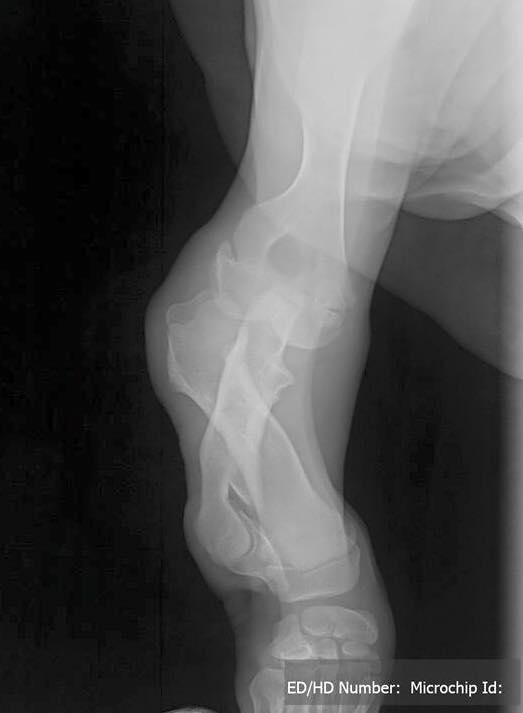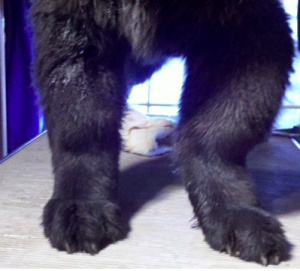339 – Crowd Sourcing Knowledge of Devastating Disease

Crowd Sourcing Knowledge of Devastating Disease
Barb Jenness, chair of the Newfoundland Club of America Forelimb Anomaly Committee, joins host Laura Reeves to talk about the crowd sourcing their group is doing to identify and research this little-known but crippling disease.
A 1981 case study conducted in Norway first described the condition:
ABSTRACT
A description of a litter of Newfoundland dogs of which six out of seven puppies suffered from, more or less, deformation of the elbow joints, is presented. The two male dogs were, because of the condition, destroyed at 20 weeks of age. The patho-anatomical examination revealed abnormalities of the joint cartilage of all the major joints of the extremities. The condition is described as a generalized fibroid, proliferative degeneration of the joint cartilage.

Photo courtesy of NCA Charitable Trust, Forelimb Anomaly Committee.
Jenness said puppies affected with FLA “their front legs bow out. It’s not dwarfism, but that’s what it looks like. Dwarfism affects all the legs, this is just the front legs.”
According to the FLA website: “We believe it is not viral, bacterial, caused by rapid growth, or a specific diet. Most researchers believe it is genetic but the exact mode of inheritance is unknown.”
The defect is often not recognized until eight to 12 weeks of age and the puppies may be in their new homes before anyone determines there is a problem, Jenness said.
Not Just Newfoundlands
A current study, and working with OFA, has enabled the Committee to identify other affected breeds, including Tibetan Mastiffs, Saint Bernards, Bernese Mountain Dogs, Nova Scotia Duck Tolling Retrievers and Chesapeake Bay Retrievers. Jenness noted that all of the breeds with affected puppies have some relation to the Newfoundland.
Jenness’ committee was established to create a clearinghouse of xrays and information because the disease is often undiagnosed or misdiagnosed. Her other primary goal is to “get the word out” to owners and club members so that if a puppy is affected, it’s xrays, DNA and case history can be added to the committee’s crowdsourcing approach to gathering data.
“Nobody wants to come face to face with such a crippling disease,” Jenness said, addressing the challenges of working with breeders on the problem. “Overcoming stigma is a challenge.”
Jenness said a test breeding was done in the ‘80s, before the availability of DNA and genetic testing available today. The test breeding mated two affected dogs, which produced zero affected progeny.
From that test, Jenness said, “We have determined it is not a simple recessive. At this point we believe it is a polygenic trait with a trigger that turns it on or off, although this still unconfirmed.”
“It’s hard to get studies funded that are focused on just one breed,” Jenness said. “As we’ve identified other breeds affected, we have ongoing studies and promising information is coming out. But we need more samples, more x-rays, more confirmed cases to be reported so we can add to the information.”
Anyone with questions or concerns about their dogs, or who would like to participate in the studies, contact Jenness at forelimbanomaly@gmail.com
Our Valued Corporate Sponsors:
Our Esteemed Advertisers:
Our In-Kind Supporters:
KNOWLEDGE IS POWER — FRANCIS BACON
When you become a patron of Pure Dog Talk you’ll tap into an exclusive community of experts to help you and your dog be blue-ribbon best at whatever you do with your purebred dog! Your support helps keep the MP3's rolling at Pure Dog Talk!
As a supporter, you’ll immediately gain access to the weekly Pure Pep Talk SMS, Pure Pep Talk private Facebook group, and priority emails. Patrons can choose to level up to the After Dark Zoom and a Patrons Digital Badge for their website— even a private counseling session with Laura on any topic.

DON'T MISS AN EPISODE!!












